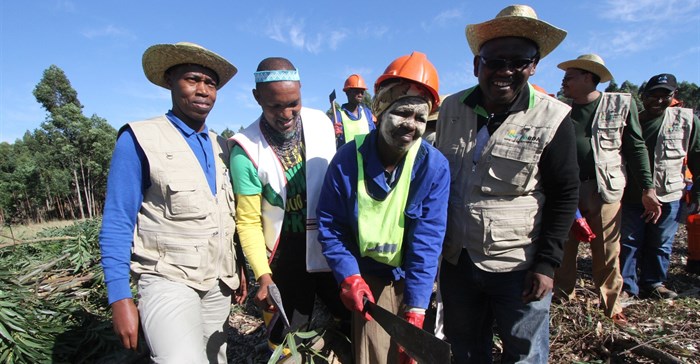The Eastern Cape Development Corporation (ECDC) and Eastern Cape Rural Development Agency (ECRDA) unveiled a major R113 million forestry commercialisation drive, in Mkambati in Flagstaff in the OR Tambo district in the Eastern Cape. The community-based forestry commercialisation drive has already resulted in 2,700 hectares (ha) of new afforestation across five projects, backed by an R83 million grant from the Development Bank of Southern Africa (DBSA) Jobs Fund.
Community-based forestry projects
The projects are Sinawo and Izinini in Mbizana, Mkambati in Flagstaff, Gqukunqa in Qumbu and Sixhotyeni in Maclear. By the end of March 2016, R56 million had already been spent on the five projects. By the end of the 2016/2017 financial, an additional 1,000ha will be planted.
The forestry commercialisation drive has identified some 15,800ha for new afforestation which will require an additional R225 million to establish. This drive has already attracted the attention and active support of forestry giants such as KwaZulu-Natal-based SAPPI Forests who have identified some 30,000ha for new afforestation in the Eastern Cape by 2033.
Funding and economic potential
“This milestone is a result of many years of hard work which began with an application to the Jobs Fund for the implementation of eight community-based forestry projects. In 2013, the DBSA Jobs Fund approved an R113 million grant on condition that of this amount ECDC and ECRDA would provide match funding of R30 million split equally between the two.
“The two partners have subsequently implemented five of the projects with the sixth being established in April 2016. The grant funding can currently cater for the establishment of 5,966ha. Some R225 million would be required to implement the envisaged 15,800ha. This is a fantastic opportunity for private and public sector investors to take advantage of the massive economic potential inherent in the sector,” says ECRDA chief executive Thozi Gwanya.
The end goal
Gwanya says some of the projects were land resettlement projects which made it easy to work with because they had legitimate owners. Strategic partners such as SAPPI and PG Bison were already assisting these communities. They were the market for the timber produced through these projects.
“The end goal is the commercialisation of communal forestry plantations. When they harvest they already have a market in partners such as SAPPI and PG Bison. In these projects, a potential exists to establish a pole treating plant where they will get feedstock from these community projects.
“At ECDC we are excited to form part of yet another exciting catalytic initiative with a strong agro-processing element which seeks to propel the Eastern Cape’s manufacturing value proposition. ECDC has deliberately positioned itself as a driver of such beneficiation efforts in the province,” says ECDC chief executive Buhle Dlulane.
Dlulane says ECDC is delighted that its partnership with the Eastern Cape Rural Development Agency is bearing the requisite fruits. “This forestry development partnership has a strong beneficiation and processing element which complements ECRDAs primary production activities. ECDC is equally pleased that this partnership is in a sector that holds significant economic potential and job creation prospects,” Dlulane explains.
For instance in Sinawo in Mbizana and in Mkambati, the community-owned forestry projects have already generated millions of rands in revenue out of the old trees that are being clear felled. The five projects have already created 819 jobs.
Model encourages growth of small businesses
In this regard, SAPPI Forests stakeholder relations manager Dr Blessing Karumbidza says the projects sell their timber to SAPPI Mills through SAPPI Forests. “Part of the agreements we have with the communities is that they only commit 70% of their timber to SAPPI. The remaining 30% provides flexibility for the community forestry projects to establish a mill in the Pondoland area such as a pole treating plant which they can supply which belongs to the community. This is the right step toward beneficiation activities in communal-owned forestry enterprises.
“This model encourages the growth of small businesses such as those that can trade in the transport of timber to the mill, the establishment of contractors trading in silviculture operations such as transporting seedlings and planting of trees. These will be businesses owned by people from these communities,” Kurumbidza says.
License application
Kurumbidza says SAPPI has already identified 30,000ha for new afforestation and is already in talks with communities. “There are already areas which are licensed where we are busy planting in Mbizana, Flagstaff, Lusikisiki and Nyandeni. We also have areas in the pipeline that are in the application process for forestry licenses. Already we are sitting at 16,000ha of licensed areas and those currently engaged in the license application process.
“We have also already planted 3,000ha in areas that we are working in the Eastern Cape which have created more than 600 jobs. If you can achieve 600 jobs with 3,000ha it means with 30,000ha by 2033 some 6,000 jobs and families will be transformed through this investment together with the expansion of the value chain,” Kurumbidza explains.
































